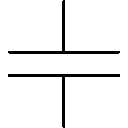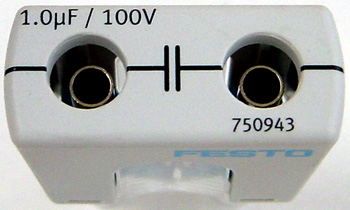Capacitor


A capacitor is a passive electrical component which is able to store electric charge (and therefore electric energy.)
The capacitor in its basic configuration consists of two electrically conductive surfaces, the electrodes. The electrodes are separated through an insulating material, the so-called dielectric. The separation of the two electrodes is so narrow, that the electrical forces are able to act through the insulating material.
If a constant voltage is applied to the connectors of an uncharged capacitor, a current flows for a short period of time and one of the electrodes is positively charged, the other one negatively. This electric charge is retained when the capacitor is disconnected from the voltage source. If charge resp. electric flow is extracted from the capacitor, its voltage drops again.
Adjustable parameters
| Designation | Range | Default value |
|---|---|---|
| Capacity | 1E-4 ... 1E7 uF | 1 |